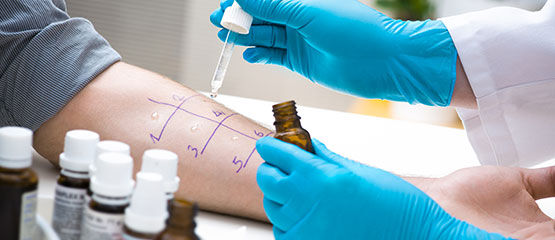Many of us have allergies, in one form or another, that can make daily life a little more tricky, but in some cases, allergies can be severe and potentially life threatening. As part of Allergy Awareness Week (26-30 April), we thought we’d share some advice on how to recognise, manage and treat common allergies.
What is an allergy?
An allergy is a reaction that the body has to a particular substance. The physical reactions often appear at the site of contact (on the skin where something has touched you, and in and around the nose and mouth if you have breathed something in or eaten something) but can also appear elsewhere if the reaction is more severe. Allergies can develop at any point, and can change over time. For example, many people suffer from hay fever, but some people have only developed this allergy in adulthood.
What are the most common allergies?
We can be allergic to anything, but the most common things include:
- Tree, grass or flower pollen (those of you with hay fever may know which particular type affects you the most, and at what of year this may occur)
- Dust mites
- Animals (often the allergy is of the skin or fur of the animal)
- Food (such as nuts, shellfish, and cow’s milk, although the list could be endless)
- Latex (often used in gloves and condoms)
- Medicines (most commonly in antibiotics if you have an allergy to penicillin)
- Household chemicals (such as cleaning detergents, washing powder or hair dyes)
- Insect bites or stings
What does an allergy look like?
Typical allergic reactions present symptoms such as
- Sneezing, runny or blocked nose
- Red, watery, itchy or sore eyes
- Red, itchy rash on the skin
- Coughing, wheezing or difficulty in breathing
Symptoms usually present quickly (within a few minutes of coming in contact with the allergen) and you should seek medical attention if symptoms worsen, as you may be suffering from anaphylaxis - a severe reaction that is classed as a medical emergency. If someone has anaphylaxis, they may feel lightheaded or faint; be having difficulties breathing (fast, shallow breathing or wheezing); have a fast heartbeat; have clammy skin; be disoriented, confused or anxious, and in severe cases they may collapse or lose consciousness.
How to treat mild allergic reactions
The most common way to treat an allergic reaction is to take antihistamines. These block histamine in the body, which is produced to protect the body from harm (i.e. from infection), and causes blood vessels to expand and skin to swell. It can be taken as a preventative measure or in response to an allergic reaction. Other treatments include steroids. These treatments are often taken in the form of tablets, a spray, or as a cream applied directly to the affected area (skin rash).
How to treat severe allergic reactions or anaphylaxis
If you are with someone that is suffering from anaphylaxis (or anaphylactic shock), you need to act quickly.
- Get them to administer their EpiPen if they have one, or do it for them if they can’t (as long as you know what to do).
- Call for emergency help (999).
- If you know what has caused the reaction, remove any traces of it if you can. For example, move potentially harmful food items out of the room and away from the individual or if possible, carefully remove the insect sting from the skin etc.
- Lie them down
- If symptoms don’t improve within a few minutes, you could administer another injection via an EpiPen, if available.
Our top tips
Here’s our top tips for coping with allergies:
- Be prepared – if you know you have an allergy to something, do your best to avoid it. For example, if you have hay fever try and avoid being outside on high pollen count days; try and keep doors and windows closed to reduce the amount of pollen coming in; don’t dry your clothes or bedding outside; and change your clothes when you come inside.
- Communicate – let others around you know about your allergy – and what treatment you use (i.e. where do you keep your EpiPen, just in case the worse happens.)
- Speak to your GP and take any medications they recommend, and remember to carry them with you.
- Get to know the symptoms (especially of anaphylaxis) so you can help yourself and others. Each person may reaction slightly differently so it good to know the standard symptoms.
If you'd like to know more about allergies, take a look at the Allergy Awareness Week 2021 website.








